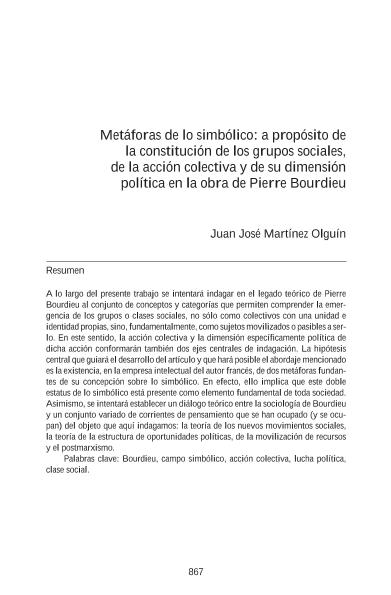Mostrar el registro sencillo del ítem
dc.contributor.author
Martínez Olguín, Juan José

dc.date.available
2023-05-16T13:50:43Z
dc.date.issued
2012-09
dc.identifier.citation
Martínez Olguín, Juan José; Metáforas de lo simbólico: a propósito de la constitución de los grupos sociales, de la acción colectiva y de su dimensión política en la obra de Pierre Bourdieu; El Colegio de México; Estudios Sociológicos; 30; 90; 9-2012; 867-896
dc.identifier.issn
0185-4186
dc.identifier.uri
http://hdl.handle.net/11336/197695
dc.description.abstract
A lo largo del presente trabajo se intentará indagar en el legado teórico de Pierre Bourdieu el conjunto de conceptos y categorías que permiten comprender la emergencia de los grupos o clases sociales, no sólo como colectivos con una unidad e identidad propia, sino, fundamentalmente, como sujetos movilizados o pasibles a serlo. En este sentido, la acción colectiva y la dimensión específicamente política de dicha acción conformarán también dos ejes centrales de indagación. La hipótesis central que guiará el desarrollo del artículo y que hará posible el abordaje mencionado es la existencia en la empresa intelectual del autor francés de dos metáforas fundantes de su concepción sobre lo simbólico. En efecto, ello implica que este doble status de lo simbólico está presente como elemento fundamental de toda sociedad. Asimismo, se intentará establecer un diálogo teórico entre la sociología de Bourdieu y un conjunto variado de corrientes de pensamiento que se han ocupado (y se ocupan) del objeto que aquí indagamos: la teoría de los nuevos movimientos sociales, la teoría de la estructura de oportunidades políticas, de la movilización de recursos y el posmarxismo.
dc.description.abstract
Throughout this paper we attempt to inquire into the theoretical legacy of Pierre Bourdieu about the set of concepts and categories for understanding the emergence of groups or social classes, not only as a collective unity and identity, but primarily as mobilized subjects or liable to be. In this sense, collective action and specifi cally political dimension of this action also will form two central axes of inquiry. The central hypothesis that will guide the development of the article and that will make the mentioned approach is the existence in the intellectual enterprise of the French author of two founding metaphors of his conception of the symbolic. In effect, this means that this dual status of the symbolic is present as a fundamental element of any society. Also, try to establish a theoretical dialogue between the sociology of Bourdieu and a diverse set of currents of thought that have addressed (and do) the object that we investigated here: the theory of new social movements, the theory of structure of political opportunities, resource mobilization and post-Marxism.
dc.format
application/pdf
dc.language.iso
spa
dc.publisher
El Colegio de México
dc.rights
info:eu-repo/semantics/openAccess
dc.rights.uri
https://creativecommons.org/licenses/by-nc-nd/2.5/ar/
dc.subject
BOURDIEU
dc.subject
CAMPO SIMBOLICO
dc.subject
ACCIÓN COLECTIVA
dc.subject
LUCHA POLÍTICA
dc.subject
CLASE SOCIAL
dc.subject.classification
Sociología

dc.subject.classification
Sociología

dc.subject.classification
CIENCIAS SOCIALES

dc.title
Metáforas de lo simbólico: a propósito de la constitución de los grupos sociales, de la acción colectiva y de su dimensión política en la obra de Pierre Bourdieu
dc.title
Metaphors of the symbolic: with regard to the constitution of social groups, collective action and its political dimension in the work of Pierre Bourdieu
dc.type
info:eu-repo/semantics/article
dc.type
info:ar-repo/semantics/artículo
dc.type
info:eu-repo/semantics/publishedVersion
dc.date.updated
2023-05-15T13:11:26Z
dc.journal.volume
30
dc.journal.number
90
dc.journal.pagination
867-896
dc.journal.pais
México

dc.journal.ciudad
Ciudad de México
dc.description.fil
Fil: Martínez Olguín, Juan José. Consejo Nacional de Investigaciones Científicas y Técnicas; Argentina. Universidad de Buenos Aires. Facultad de Ciencias Sociales. Instituto de Investigaciones "Gino Germani"; Argentina
dc.journal.title
Estudios Sociológicos

dc.relation.alternativeid
info:eu-repo/semantics/altIdentifier/url/https://estudiossociologicos.colmex.mx/index.php/es/article/view/96
dc.relation.alternativeid
info:eu-repo/semantics/altIdentifier/doi/https://doi.org/10.24201/es.2012v30n90.96
Archivos asociados
